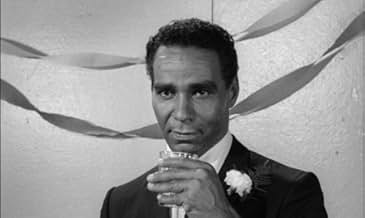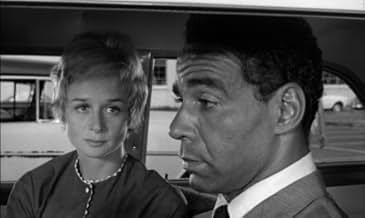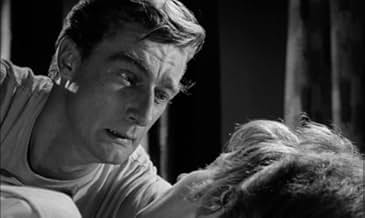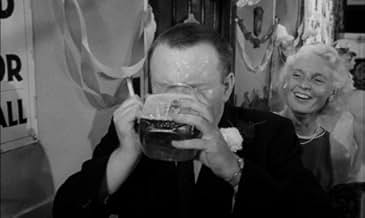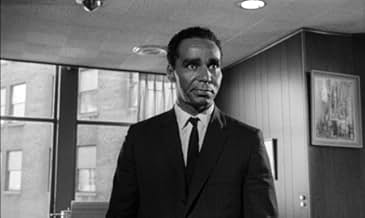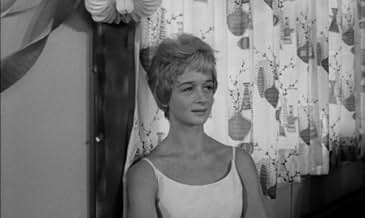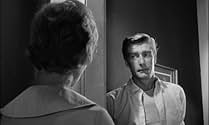Une femme tombe amoureuse et épouse un homme afro-américain. Aidé par un juge qui représente les préjugés de l'époque, son ex-mari demande la garde de son enfant, arguant qu'un foyer mixte e... Tout lireUne femme tombe amoureuse et épouse un homme afro-américain. Aidé par un juge qui représente les préjugés de l'époque, son ex-mari demande la garde de son enfant, arguant qu'un foyer mixte est un endroit inapproprié pour élever leur fille.Une femme tombe amoureuse et épouse un homme afro-américain. Aidé par un juge qui représente les préjugés de l'époque, son ex-mari demande la garde de son enfant, arguant qu'un foyer mixte est un endroit inapproprié pour élever leur fille.
- Réalisation
- Scénario
- Casting principal
- Nommé pour 1 Oscar
- 2 victoires et 4 nominations au total
- Ellen Mary
- (as Marti Mericka)
- Martha Richards
- (as Vinette Carroll)
- Johnny Hruska
- (as Sam Weston)
- Orchestra Leader
- (non crédité)
- Bart
- (non crédité)
- Saxophone Player
- (non crédité)
- Minister's Wife
- (non crédité)
- Lawyer
- (non crédité)
- Wedding Guest
- (non crédité)
- Wedding Guest
- (non crédité)
Avis à la une
Julie (Barrie) is a divorced mother of a young girl. The father abandoned them years ago and Julie works at the company where Frank (Bernie Hamilton) works. The meet and through the course of spending time together, they find that there is an attraction. Eventually, they decide to get married--even though they realize it might cause a few heads to turn. After all, she is white and he is black. Despite a bumpy start, things work out and the young family prospers and grows. Things look pretty good, right? Well, they do until the child's biological father shows up unexpectedly. Now the man (?) wants his daughter--mostly because his ego cannot stand that his ex- is with a black man.
This is a well made film but I must warn you that it will rip your heart out. This is NOT a complaint. Heck, back in 'the good old days', it was STILL illegal for blacks and whites to marry in many southern states and in others it was quite possible to lose custody of a child simply because you married someone of another race. Crazy...and pretty stupid. So, it's great that the movie draws attention to it. My only complaint is that the film, while very interesting, is way underplayed--too underplayed. Some more emotion in the acting and relationship between Frank and Julie would have made the movie better overall.
Le saviez-vous
- AnecdotesIntermarriage between African-Americans and Caucasians was illegal in 16 states until the US Supreme Court decision Loving v. Virginia was handed down on June 12, 1967. The court unanimously ruled that anti-miscegenation marriage laws were unconstitutional. In his opinion, Chief Justice Earl Warren wrote, "The freedom to marry has long been recognized as one of the vital personal rights essential to the orderly pursuit of happiness by free men. Marriage is one of the 'basic civil rights of man, fundamental to our very existence and survival. To deny this fundamental freedom on so unsupportable a basis as the racial classifications embodied in these statutes, classifications so directly subversive of the principle of equality at the heart of the Fourteenth Amendment, is surely to deprive all the State's citizens of liberty without due process of law. The Fourteenth Amendment requires that the freedom of choice to marry not be restricted by invidious racial discriminations. Under our Constitution, the freedom to marry, or not marry, a person of another race resides with the individual and cannot be infringed by the State." Interestingly, many anti-miscegenation marriage laws were enacted in the wake of African-American heavyweight champion Jack Johnson's marriages to two Caucasian women, as pointed out in Ken Burns' documentary Unforgivable Blackness: The Rise and Fall of Jack Johnson (2004). Johnson married his white mistress Etta Duryea in late 1910 or early 1911, then married another white woman, Lucille Cameron, soon after his first wife's September 1911 suicide. The two marriages outraged white America, and Johnson and Cameron fled America for Canada and then Europe under threat of lynching. Their relationship was fictionalized in the stage play, and subsequent movie, L'Insurgé (1970), for which the Caucasian playwright Howard Sackler won the Pulitzer Prize. The 1913 Massachusetts anti-miscegenation marriage law, which did not recognize any marriage made in a state forbidding the marriage of different classifications of people (the law left unspoken the racial issue of black and white; in Virginia, blacks were allowed to marry other, non-white "races"), was considered inoperative after Loving v. Virginia until in 2005, then-governor Mitt Romney used it as the basis to deny out-of-state couples the right to wed in the Commonwealth of Massachusetts after the Bay State's Supreme Court legalized gay marriage.
- Citations
Jordan Hollis: What do I have to kid you for. I could get a black eye out of a case like this. What the Hell did you have to come to me for? Why do you have to do this to your friend?
- ConnexionsFeatured in C'est assez noir pour vous?!? (2022)
Meilleurs choix
- How long is One Potato, Two Potato?Alimenté par Alexa
Détails
- Date de sortie
- Pays d’origine
- Langue
- Aussi connu sous le nom de
- One Potato, Two Potato
- Lieux de tournage
- Painesville, Ohio, États-Unis(".............where this picture was shot in its entirety, our thanks.")
- Société de production
- Voir plus de crédits d'entreprise sur IMDbPro
Box-office
- Budget
- 340 000 $US (estimé)
- Durée
- 1h 32min(92 min)
- Couleur
- Mixage
- Rapport de forme
- 1.37 : 1

